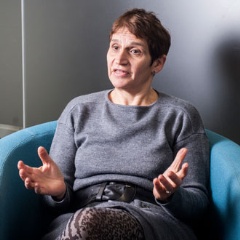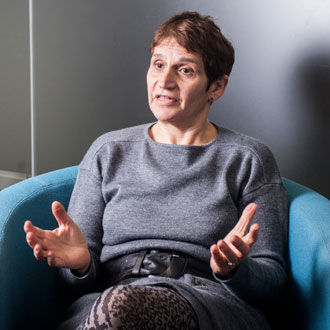
Professor Clare Gerada is a woman who never keeps still for long. ‘We’ve only got 20 minutes,’ she says as we scuttle along a corridor at NHS London’s head office.
Pulse meets the former RCGP chair after she revealed a radical blueprint for how general practice should change in the capital.
Her report’s vision may be unpalatable to many GPs: larger practices, providing seven-day access and working to a joint contract with hospitals and social care.
But it comes at an important time. The new chief executive of NHS England has just published his Five Year Forward View that identified primary care as a key area for reform.
Professor Gerada’s ideas mirror Simon Steven’s model of practices developing into ‘multispecialty community providers’ that offer much more care outside hospital and integrate closely with mental health, social care and pharmacy services.
She is keen to stress that her ideas are not a huge departure from where the profession was heading anyway. ‘The report consolidates what’s been going on for the last 15 years,’ she explains.
‘The plans are something the RCGP have been promoting since Professor Mayur Lakhani’s chairmanship in 2004 when he introduced the roadmap for general practice, talking about federations and co-locating community services.’
She adds: ‘In the 1990s we were well on track for practices working or learning together. We’ve had too many reorganisations since and we’ve fractured that. I want general practice to get back to where we were in 1999.’
The ‘transformation framework’ report – led by Professor Gerada and senior managers at the London area team – calls for groups of practices merging or federating to provide a much wider range of services. It says that some will opt out of GMS to form ‘super partnerships’ under an APMS contract and reach out to marginalised groups, such as the homeless, sex workers and those with mental illness.
It is an extension of the ideas that Professor Gerada promoted as RCGP chair and they come a significant amount of additional investment- £810m per year – attached.
But will it mean the end of the GP partnership model? She says: ‘What we’ve got to look at today is an unreasonable workload and unreasonable demands on GPs.
‘On the one hand partnerships give you a certain amount of autonomy – I think we overrate that autonomy. You can’t dictate your opening hours or what services you provide – so maintaining our independence, but maybe not our contractual status would be a good middle ground.’
‘I don’t think everyone will end up being salaried (in the near future). I think there will be different models. I think we’ve already seen it in London. But if you say will there be independent contractors in London in ten years’ time – I suspect not.’
All of London’s 32 CCGs have declared support for her ideas, but the reaction amongst her peers has been – at times – negative. ‘GPs simply do not agree with your vision,’ said one GP on the Pulse website. ‘The goodwill and trust to drive any change has gone,’ said another.
But Professor Gerada puts this down to nihilism: ‘GPs are so demoralised that even when there’s good news they can’t see it. It’s a bit like Maslow’s hierarchy of needs – at the moment we’re just about surviving.’
Professor Clare Gerada’s CV
- Qualified in medicine at University College, London, in 1982.
- Trained in psychiatry and worked at the Maudsley Hospital in south London, specialising in substance misuse.
- Qualified as a GP in 1992.
- Became a partner at the Hurley Clinic, a practice in south London.
- She was senior policy advisor for drugs and alcohol at the Department of Health between 1996-2000
- Awarded an MBE for services to medicine and substance misuse in June 2000.
- Established the RCGP’s Certificate in the Management of Drug Misuse in 2001. Sat as chair of the RCGP ethics committee and council vice chair before being voted in as chair in November 2010. She became the college’s first female chair for 50 years.
- She is currently chair of clinical board, primary care transformation, NHS England (London region)
She adds: ‘I’m a lightning rod for the negative feelings that GPs rightly have at the moment. We have a paradox. More and more is being asked of GPs and yet we’re getting more and more flak. I feel it every day in my consulting room.’
Professor Gerada is no stranger to controversy. When RCGP chair, she led opposition to the Health and Social Care Act before it came law and used the RCGP annual conference to call for the profession to reconsider its independent status.
But probably her greatest achievement was to begin to reverse the narrative that GPs were paid too much, and press home the idea that practices need greater investment to survive.
She says: ‘We’ve started to hear the noises now about real money – GPs nationwide need far more than that the £1.2bn the chancellor announced [in the Autumn Statement].
‘We need a shift of 10% of the NHS budget – about £12 billion per annum – shifted back into general practice. We particularly need the money for premises redevelopment, and workforce and organisational issues.
‘CCGs are keen to move the money into primary care. If we don’t CCGs will have to continue commissioning specialist services at the rate they do now, and it will bankrupt the NHS.’
Was it a hard move from the RCGP to NHS England? She pauses briefly, and says: ‘I haven’t come to NHS England London region to present completely different views to the ones I had at the RCGP. My views are the same. It’s been a difficult journey coming here, because I’ve had to voice the concerns of my profession.’
And Professor Gerada does this very well. Recently, in her role as medical director of the Practitioner Health Programme, she attacked proposals by the GMC to toughen up fitness to practise sanctions, claiming they could lead to GPs being ‘scapegoated’, and has loudly criticised the CQC.
She says: ‘But it’s a simple fact that more GPs with more resources will deliver a safer, better health services. If anything I’m being more forceful because I’ve commented on issues such as the GMC and the CQC, which you would not expect given the role I’m in.’
And – unlike many big names, she does not hide behind a bevy of media spokespeople and is happy to speak with anyone about her ideas. ‘I would say pick up the phone and speak to me and tell me what your criticisms are,’ she urges her critics.
Whether you agree with her ideas or not, you cannot doubt Professor Gerada’s bravery.
Quick-fire Q&A
What are your thoughts on the £55 dementia diagnosis scheme?
It’s awful. Paying the GPs to do something interferes with their relationship with the patient and they might wonder if the GP is doing it because they are being paid or because it’s in the patient’s best interest.
Would you abolish CQC inspections?
If I was in charge of the CQC I would spend the vast amount of money tied up in the CQC to free up GPs to have time to reflect.
Where do you stand on practice boundaries?
I’m very worried about it. What you’re not doing is cherry-picking fit and healthy patients to give yourself an easy ride – not patients choosing the practice but GPs choosing the patients.
You have a large Twitter following. How did you build it up?
I got run over on Blackfriars Bridge, broke my foot and tweeted from St Thomas’s Hospital about my care. Up until then the college had been very wary of what I’d tweeted.
Pulse October survey
Take our July 2025 survey to potentially win £1.000 worth of tokens













